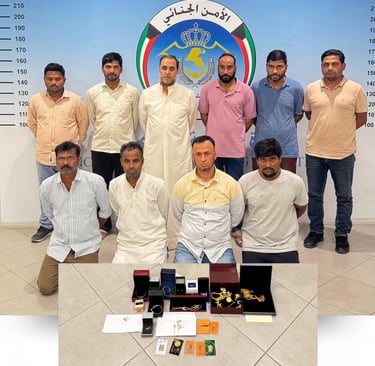Add your promotional text...
PACI Employee Arrested for Accepting Bribes to Alter Addresses
A Public Authority for Civil Information (PACI) employee was arrested at Kuwait’s Nuwaiseeb border crossing for allegedly accepting bribes to change registered addresses on civil ID cards—part of a larger crackdown on address fraud amid a booming black market.
Waqar Javeed
7/4/20251 min read


KUWAIT CITY, July 3, 2025 — Kuwaiti authorities arrested a Public Authority for Civil Information (PACI) employee at the Nuwaiseeb border crossing, accusing them of accepting bribes in exchange for altering residential addresses on civil ID cards—an offense uncovered amid the ongoing black-market boom for fake addresses (arabtimesonline.com).
Background: PACI Crackdown on Fake Addresses
Since late April, PACI has been canceling invalid or unverified addresses, removing 531 individuals from its registry and mandating a 30-day window for correction to avoid fines up to 100 KD under Article 33 of Law No. 32/1982 (arabtimesonline.com).
Enforcement increased after a fire in Mangaf and following directives from Acting Prime Minister Sheikh Fahad Al‑Yousef, targeting densely populated expatriate areas like Hawalli, Jleeb Al‑Shuyoukh, and Mahboula—revealing extensive use of bogus registrations (arabtimesonline.com).
Black-Market Exploitation
A shady underground network has emerged, with address “merchants” charging between 100–150 KD per fake address—primarily targeting workers from Asia in desperate need of valid registration (arabtimesonline.com).
Victims often discover their fraudulent addresses have been recycled by the merchants, prompting repeated payments to maintain their civil ID registration (arabtimesonline.com).
Consequences & Systemic Measures
Address cancellations have been communicated via the “Sahel” and “Hawiyati” apps, while PACI has struggled with high demand at both its main and external centers (timeskuwait.com).
Residents affected must now submit proof—including lease contracts, ownership documents, and residency declarations—to update their addresses legally (timeskuwait.com).
This crackdown is part of a broader effort to enhance civil registry accuracy, promote public safety, and facilitate more effective law enforcement cooperation (arabtimesonline.com).
